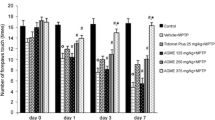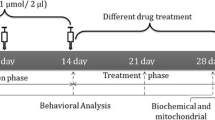Abstract
1-Methyl-4-phenyl-1,2,3,6-tetrahydropyridine (MPTP) has been widely used due to its specific and reproducible neurotoxic effect on the nigrostriatal system, being considered a convenient model of dopaminergic neurodegeneration to study interventions therapeutics. The purple pitanga (Eugenia uniflora) is a polyphenol-rich fruit with antioxidant and antidepressant properties, among others. Therefore, this study investigated the effect of purple pitanga extract (PPE) on acute early oxidative stress induced by intranasal 1-methyl-4-phenyl-1,2,3,6-tetrahydropyridine (MPTP) administration in rats. Male Wistar rats were pre-treated orally with PPE (1000 mg/kg) or vehicle. After 24 h, MPTP (0.1 mg/10µL/nostril) or vehicle was administered bilaterally into the animal’s nostrils, and 6 h later, the olfactory bulb (OB), striatum (ST), and substantia nigra (SN) were collected to evaluate the oxidative stress parameters. Our findings revealed that OB and SN were the most affected areas after 6 h of MPTP infusion; an early increase in reactive oxygen species (ROS) levels was observed, while pretreatment with a single dose of PPE prevented this increment. No differences in thiobarbituric acid reactive species (TBARS) and 3-nitrotyrosine (3-NT) formation were observed, although 4-hydroxy-2-nonenal (4-HNE) levels increased, which is the most toxic form of lipid peroxidation, in the MPTP group. The PPE pretreatment could prevent this increase by increasing the NPSH levels previously decreased by MPTP. Furthermore, PPE prevents the Na+/K + ATPase strongly inhibited by MPTP, showing the neuroprotective capacity of the PPE by inhibiting the MPTP-generated oxidation. Thus, we demonstrated for the first time the antioxidant and neuroprotective effects of PPE against the early MPTP neurotoxicity.





Similar content being viewed by others
References
Abou-Sleiman PM, Muqit MM, Wood NW (2006) Expanding insights of mitochondrial dysfunction in Parkinson’s disease. Nat Rev Neurosci. ;7(3):207 – 19. https://doi.org/10.1038/nrn1868. PMID: 16495942
Ali SF, LeBel CP, Bondy SC (1992) Reactive oxygen species formation as a biomarker of methylmercury and trimethyltin neurotoxicity. Neurotoxicology. ; Fall;13(3):637 – 48. PMID: 1475065
Amro MS et al The potential role of herbal products in the treatment of Parkinson’s Disease. Clin Ter 2018; Jan-Feb ;169 (1): e23–e33. https://doi.org/10.7417/T.2018.2050. PMID: 29446788
Blesa J et al (2015) Oxidative stress and Parkinson’s Disease. Frente Neuroanat 9:91. https://doi.org/10.3389/fnana.2015.00091
Bloem BR, Okun MS, Klein C. (2021) Parkinson’s disease. The Lancet Jun 12;397(10291):2284–303. https://doi.org/10.1016/S0140-6736(21)00218-X
Bradford MM (1976) A rapid and sensitive method for the quantitation of microgram quantities of protein utilizing the principle of protein-dye binding. Anal Biochem. May 7;72:248 – 54. PMID: 942051 https://doi.org/10.1006/abio.1976.9999
Brandão R, Santos FW, Oliveira R et al (2009) Involvement of non-enzymatic antioxidant defenses in the protective effect of diphenyl diselenide on testicular damage induced by cadmium in mice. J Trace Elem Med Biol 23:324–333
Cao L et al (2021) Anti–Na+/K+–ATPase immunotherapy ameliorates α-synuclein pathology through activation of Na+/K+–ATPase α1–dependent autophagy. Science Advances. ;7: eabc5062 Jan27. https://doi.org/10.1126/sciadv.abc5062
Celli GB, Pereira-Netto AB, Beta T (2011) Comparative analysis of total phenolic content, antioxidant activity, and flavonoids profile of fruits from two varieties of Brazilian cherry (Eugenia uniflora L.) throughout the fruit developmental stages. Food Research, ; International 44, pp.2442–2451. https://doi.org/10.1016/j.foodres.2010.12.036
Da Costa Sobral KG et al (2021) Anticonvulsant activity of β-caryophyllene in association with Pregabalin in a seizure model in rats. Epilepsy Res 179:106842. https://doi.org/10.1016/j.eplepsyres.2021.106842. Epub ahead of print. PMID: 34942451
Dauer W, Przedborski S (2003) Parkinson’s disease: mechanisms and models. Neuron. ; Sep 11;39(6):889–909. PMID: 12971891.https://doi.org/10.1016/s0896-6273(03)00568-3
Denardin CC et al (2015) Antioxidant capacity and bioactive compounds of four Brazilian native fruits. J Food Drug Anal 23:387–398. https://doi.org/10.1016/j.jfda.2015.01.006
Dhuria SV, Hanson LR, Frey WH 2 (2010) nd. Intranasal delivery to the central nervous system: mechanisms and experimental considerations. J Pharm Sci. ;99(4):1654-73. https://doi.org/10.1002/jps.21924. PMID: 19877171
Di Domenico F, Tramutola A, Butterfield DA (2017) Role of 4-hydroxy-2-nonenal (HNE) in the pathogenesis of alzheimer Disease and other selected age-related neurodegenerative disorders. Free Radic Biol Med Oct; 111:253–261 Epub 2016 Oct 24. PMID: 27789292. https://doi.org/10.1016/j.freeradbiomed.2016.10.490
Dias V, Junn E, Mouradian MM (2013) The role of oxidative stress in Parkinson’s Disease. J Parkinsons Dis 3(4):461–491. https://doi.org/10.3233/JPD-130230PMID: 24252804; PMCID: PMC4135313
Dringen R, Gutterer JM, Hirrlinger J (2000) Glutathione metabolism in brain metabolic interaction between astrocytes and neurons in the defense against reactive oxygen species. Eur J Biochem. ;267(16):4912-6. https://doi.org/10.1046/j.1432-1327.2000.01597.x. PMID: 10931173
Ellman GL (1959) Tissue sulfhydryl groups. Arch Biochem Biophys May; 82(1):70–77 PMID: 13650640. https://doi.org/10.1016/0003-9861(59)90090-6
Ferrer I, Martinez A, Blanco R, Dalfó E, Carmona M (2011) ; May;118(5):821 – 39. Epub 2010 Sep 23. PMID: 20862500. https://doi.org/10.1007/s00702-010-0482-8
Fidelis EM et al (2022) Pitanga (Eugenia uniflora L.) as a source of bioactive compounds for health benefits: a review. Arab J Chem 15:1–22. https://doi.org/10.1016/j.arabjc.2022.103691
Fiske CHe, SubbaRow Y The colorimetric determination of Phosphorus. J Biol 1925 Chem 66, 375–400
Franco J, Prediger DS, Pandolfo P (2007) Antioxidant responses and lipid peroxidation following intranasal 1-methyl-4-phenyl-1,2,3,6-tetrahydropyridine (MPTP) administration in rats: increased susceptibility of olfactory bulb. Life Sci 80:1906–1914 ISSN 0024-3205. https://doi.org/10.1016/j.lfs.2007.02.021
Gainetdinov RR et al (1997) Dopamine transporter is required for in vivo MPTP neurotoxicity: evidence from mice lacking the transporter. J Neurochem. ;69(3):1322-5.PMID: 9282960. https://doi.org/10.1046/j.1471-4159.1997.69031322.x
Halliwell B (2001) Role of Free Radicals in the Neurodegenerative Diseases Therapeutic Implications for Antioxidant Treatment. Drugs & Aging. ; 18 (9): 685–716 1170-229X/01/0009-0685/$22.00/0
Hertog MG, Hollman PC, Katan MB (1992) Content of potentially anticarcinogenic flavonoids of 28 vegetables and 9 fruits commonly consumed in the Netherlands. J Agric Food Chem 40:2379–2383
Höglinger GU et al (2015) A new dopaminergic nigro-olfactory projection. Acta Neuropathol 130(3):333–348. https://doi.org/10.1007/s00401-015-1451-yEpub 2015 Jun 14. PMID: 26072303
Jiao Y, Dou Y, Lockwood G, Pani A, Jay Smeyne R (2015) Acute effects of 1-methyl-4-phenyl-1,2,3,6-tetrahydropyridine (MPTP) or paraquat on Core temperature in C57BL/6J mice. J Parkinsons Dis 5(2):389–401 PMID: 25633843; PMCID: PMC4923733. https://doi.org/10.3233/JPD-140424
Jin Meng-meng et al (2018) A critical role of Autophagy in regulating Microglia polarization in Neurodegeneration. Front Aging Neurosci 10. https://doi.org/10.3389/fnagi.2018.00378
Kadar H et al (2014) MALDI mass spectrometry imaging of 1-methyl-4-phenylpyridinium (MPP+) in mouse brain. Neurotox Res. ;25(1):135 – 45. https://doi.org/10.1007/s12640-013-9449-5. Epub 2013 Dec 18. PMID: 24347373
Kumar AR, Kurup PA (2002) Inhibition of membrane Na+-K + ATPase activity: a common pathway in central nervous system disorders. J Assoc Physicians India. ;50:400-6. PMID: 11922232
Langston JW, Ballard P, Tetrud JW, Irwin I Chronic Parkinsonism in humans due to a product of meperidine-analog synthesis. Science. 1983; Feb 25;219(4587):979 – 80. PMID: 6823561. https://doi.org/10.1126/science.6823561
Li Bi Y, Ma YH, Zhang (2017) Oxidative stress and hepatotoxicity in the frog Rana chensinensis, when exposed to low doses of trichlorfon. J Environ Sci Health B 52:476–482. https://doi.org/10.1080/03601234.2017.1303321
Lima VLAG et al (2005) The effects of light and freezing temperature upon the stability of purple Surinam cherry’s anthocyanins. Food Sci Technol 25(1) • Mar 2005. https://doi.org/10.1590/S0101-20612005000100015
Liu J, Lilly MN, Shapiro JI (2018) Targeting Na/K-ATPase signaling: a New Approach to control oxidative stress. Curr Pharm Des 24(3):359–364. https://doi.org/10.2174/1381612824666180110101052
Lv C et al (2012) Effect of Quercetin in the 1-Methyl-4-phenyl-1, 2, 3, 6-tetrahydropyridine-Induced Mouse Model of Parkinson’s Disease. Evid Based Complement Alternat Med 2012:928643 Epub 2012 Feb 9. PMID: 22454690; PMCID: PMC3290831. https://doi.org/10.1155/2012/928643
Marques NF et al (2018) Atorvastatin prevents early oxidative events and modulates inflammatory mediators in the Striatum following intranasal 1-Methyl-4-phenyl-1,2,3,6-tetrahydropyridine (MPTP) administration in rats. Neurotox Res 33:549–559. https://doi.org/10.1007/s12640-017-9840-8
Morales M, Munné-Bosch S, Malondialdehyde (2019) Facts and artifacts. Plant Physiol 180(3):1246–1250. https://doi.org/10.1104/pp.19.00405PMID: 31253746; PMCID: PMC6752910
Mosley RL et al (2006) Neuroinflammation, Oxidative Stress and the Pathogenesis of Parkinson's Disease. Clin Neurosci Res. 2006 Dec 6;6(5):261–281. https://doi.org/10.1016/j.cnr.2006.09.006
Ohkawa H, Ohishi N, Yagi K (1979) Assay for lipid peroxides in animal tissues by thiobarbituric acid reaction. Anal Biochem Jun; 95(2):351–358 PMID: 36810. https://doi.org/10.1016/0003-2697(79)90738-3
Olufunmilayo EO, Gerke-Duncan MB, Holsinger RMD (2023) Oxidative stress and antioxidants in neurodegenerative disorders. Antioxidants 12(2):517. https://doi.org/10.3390/antiox12020517
Paganga G, Miller N, Rice-Evans CA (1999) The polyphenolic content of fruit and vegetables and their antioxidant activities. What does a serving constitute? Free Radic Res 30:153–162
Prediger RD et al (2006) The risk is in the air: intranasal administration of MPTP to rats reproducing clinical features of Parkinson’s Disease. Exp Neurol 202(2):391–403. https://doi.org/10.1016/j.expneurol.2006.07.001
Prediger RD et al (2011) The intranasal administration of 1-methyl-4-phenyl-1,2,3,6-tetrahydropyridine (MPTP): a new rodent model to test palliative and neuroprotective agents for Parkinson’s Disease. Curr Pharm Des 17(5):489–507 PMID: 21375482. https://doi.org/10.2174/138161211795164095
Rechner AR et al (2002) The metabolic fate of dietary polyphenols in humans. Free Radical Biol Med 33:220–235
Sampaio TB et al (2017) Review Article: The Relevance of Intranasal Route in Parkinson’s Disease: from Physiopathological Alterations to Administration of Neurotoxins. Clin Pharmacol Transl Med. 2017; 1(2): 20–7. https://doi.org/10.31700/2572-7656.000105
Sardi JCO et al Unexplored endemic fruit species from Brazil: Antibiofilm properties, insights into mode of action, and systemic toxicity of four Eugenia Spp. Microb Pathogenesis Volume 105, Pages 280–287,ISSN; 0882–4010, https://doi.org/10.1016/j.micpath.2017.02.044
Saura J et al (1997) Biphasic and region-specific MAO-B response to aging in normal human brain. Neurobiol Aging 18:497–507
Savall ASP et al (2023) Neuroprotective effect of Eugenia uniflora against intranasal MPTP-induced memory impairments in rats: the involvement of pro-BDNF/p75NTR pathway. Life Sci 324:121711. https://doi.org/10.1016/j.lfs.2023.121711Epub 2023 Apr 23. PMID: 37088413
Schildknecht S (2017) Tipping Points and Endogenous Determinants of Nigrostriatal Degeneration by MPTP. Trends Pharmacol Sci. Jun;38(6):541–555. https://doi.org/10.1016/j.tips.2017.03.010
Skibola CF, Smith MT (2000) Potential health impacts of excessive flavonoid intake. Free Radic Biol Med 29(3–4):375–383. https://doi.org/10.1016/s0891-5849(00)00304-x
Stefanatos R, Sanz A (2017) The role of mitochondrial ROS in the aging brain. J FEBS Lett. https://doi.org/10.1002/1873-3468.12902. Nov 06
Stoker TB, Barker RA (2020) Recent developments in the treatment of Parkinson’s Disease. F1000Res. ;9:F1000 Faculty Rev-862. https://doi.org/10.12688/f1000research.25634.1. PMID: 32789002; PMCID: PMC7400683
Strathearn KE, Yousef GG, Grace MH et al Neuroprotective effects of anthocyanin- and proanthocyanidin-rich extracts in cellular models of Parkinson׳s Disease. Brain Res 2014; Mar 25;1555:60–77. Epub Feb 3. PMID: 24502982; PMCID: PMC4024464. https://doi.org/10.1016/j.brainres.2014.01.047
Tambara L, de Los Santos Moraes AH, Dal Forno et al (2018) Purple pitanga fruit (Eugenia uniflora L.) protects against oxidative stress and increase the lifespan in Caenorhabditis elegans via the DAF-16/FOXO pathway. Food Chem Toxicol 120:639–650. https://doi.org/10.1016/j.fct.2018.07.057
Trist BG, Hare DJ, Double KL (2019) Oxidative stress in the aging substantia nigra and the etiology of Parkinson’s Disease. Aging Cell Dec; 18(6):e13031 Epub 2019 Aug 20. PMID: 31432604; PMCID: PMC6826160. https://doi.org/10.1111/acel.13031
Wang X, Michaelis EK (2010) Selective neuronal vulnerability to oxidative stress in the brain. Front Aging Neurosci 2:12. https://doi.org/10.3389/fnagi.2010.00012PMID: 20552050; PMCID: PMC2874397
Xie Z, Askari A (2002) Na+/K+-ATPase as a signal transducer. Eur J Biochem 269:24342439. https://doi.org/10.1046/j.1432-1033.2002.02910.x
Zhang L et al (2019) Semaglutide is neuroprotective and reduces α-Synuclein levels in the chronic MPTP Mouse Model of Parkinson’s Disease. J Parkinsons Dis 9(1):157–171 PMID: 30741689. https://doi.org/10.3233/JPD-181503
Zheng R et al (2014) Modulation of keratinocyte expression of antioxidants by 4-hydroxynonenal, a lipid peroxidation end product. Toxicol Appl Pharmacol. ; Mar 1;275(2):113 – 21. Epub 2014 Jan 11. PMID: 24423726; PMCID: PMC4167054.https://doi.org/10.1016/j.taap.2014.01.001
Zhu YL et al (2019) Neuroprotective effects of Astilbi“on MPTP-induced Parkinson’s Disease mice: glial reaction, α-synuclein expression and oxidative stress. Int Immunopharmacol 66:19–27 Epub 2018 Nov 9. PMID: 30419450. https://doi.org/10.1016/j.intimp.2018.11.004.
Acknowledgements
The authors are thankful to UNIPAMPA, FAPERGS, CAPES, FINEP and CNPq. S.P, D.S.A and E.M.F. are recipients of CNPq fellowships and A.S.P.S., A.A.C.N and C.B.Q have fellowships from CAPES. We would also like to thank Atlas Assessoria Linguística for language editing and Cristiane Denardin for PPE obtention.
Author information
Authors and Affiliations
Corresponding author
Additional information
Publisher’s Note
Springer Nature remains neutral with regard to jurisdictional claims in published maps and institutional affiliations.
Rights and permissions
Springer Nature or its licensor (e.g. a society or other partner) holds exclusive rights to this article under a publishing agreement with the author(s) or other rightsholder(s); author self-archiving of the accepted manuscript version of this article is solely governed by the terms of such publishing agreement and applicable law.
About this article
Cite this article
Fidelis, E.M., Savall, A.S.P., Mello, J.D. et al. Purple pitanga extract (Eugenia uniflora) attenuates oxidative stress induced by MPTP. Metab Brain Dis 38, 2615–2625 (2023). https://doi.org/10.1007/s11011-023-01318-z
Received:
Accepted:
Published:
Issue Date:
DOI: https://doi.org/10.1007/s11011-023-01318-z




